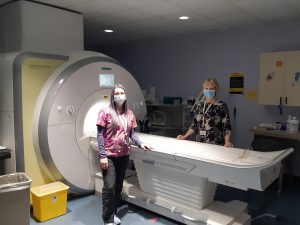Magnetic resonance imaging (MRI)
What we do

Magnetic resonance imaging (MRI) is performed by a technologist who is specially trained. MRI provides remarkably detailed images of the body without the use of X-rays. It uses magnets, radio waves and a computer to produce detailed images of the body.
MRI scans provide greater detail of body tissues and organs than other medical imaging tests. MRI scanners can more accurately detect conditions of the brain, spinal cord, abdomen, bones and joints. MRS scans are commonly used for:
- Injuries of soft tissue structures and joints.
- Diagnosis of heart conditions.
- Examination of the abdomen and pelvis.
- Examination of the brain, neck and spinal cord.
- Detection of tumors and other pathological conditions.
What patients can expect
The MRI machine is a large cylindrical magnetic tube. The patient lies on a table, feet or headfirst, depending on the area of the body to be scanned. The head, arms or legs may be secured with straps to prevent movement. The table then slides into the magnetic chamber. Inside the chamber, the patient may feel air moving around and hear very loud thumping sounds. The thumping indicates when the MRI scans are being taken.
Patients should not feel any discomfort from the magnet or radio waves, nor should they have any after-effects from the examination.
A contrast dye, called Gadolinium, may be injected to show blood vessels and organs more clearly. It is very rare to have any reaction to this type of contrast. Once injected, you may feel a cool sensation and have a metallic taste in your mouth.
If you are claustrophobic, please discuss this with your doctor before you come for your MRI examination. In some cases, your doctor may prescribe a mild sedative which can be used to help ease anxiety during the test. This medication must be given to you prior to your appointment as it will not be given upon arrival. If you require sedation for your MRI exam, you must bring a responsible driver with you otherwise your examination will be cancelled.
To avoid blurring of the images, it is important to remain still during the procedure. MRI scans take about 30 minutes, however complex MRI procedures could take up to two hours.
Locations that offer this service
Please note:
- Patients are notified by telephone and/or appointment letter for all services that require an appointment.
How to prepare
Preparation will vary by procedure. Instructions for preparation specific to your test (or procedure) will be included in your appointment letter. The doctor that ordered your examination may also give you information about the required preparation.
You must:
- Not wear any makeup or hair products on the day of the exam.
- Remove all piercings or jewelry from your body.
- Not wear any athletic clothing that contains metallic threads.
- Be prepared to answer medical questions regarding all your surgical history.
- Bring a list of medications with you to your appointment.
- Before the procedure, you will be asked to remove your clothing and all other items attached to the body and change into a gown.
- Not bring anything valuable to the MRI Department.
Test results
Your examination will be reported by a radiologist and will be sent to your doctor within 15 business days.. Please check with your doctor’s office to find out if your report has been received.
Benefits
MRI produces very detailed images of soft tissues allowing for the accurate diagnosis of many conditions such as tumors and other abnormalities that may not be visible with other imaging methods. MRI is the only imaging tool that can diagnose multiple sclerosis.
Risks
The doctor and the MRI technologist will ask specific questions about implants before you are booked for your MRI scan, and before the technologist starts your MRI scan. Any undetected metallic implants in your body may cause serious harm or injury, so it is very important that you advise the doctor and technologist of any implants prior to having your MRI scan.
The MRI scan is quite loud, and it requires that you have hearing protection during the scan.
Contrast materials may be used in the procedure and it has little likelihood of causing an allergic reaction. If you have had an allergy to CT contrast, it does not mean you cannot have MRI contrast. These types of contrast are completely different. Please discuss your concerns with your doctor or the technologist before you have your MRI scan.
Safety precautions
Because of the strong magnetic field, MRI scans cannot always be performed on patients with:
- Pacemakers/implanted cardiac defibrillators (ICDs).
- Blood vessel clips, brain aneurysm clips.
- Implanted pumps, stimulators, shunts.
- Metal in the eyes or sockets.
- Hearing implants (e.g. cochlear implants.)
- Artificial limbs.
- Other implanted metal devices.
These devices must be checked by the technologists before your scan to ensure that the MIR can be performed safely. Depending on the manufacturers’ specifications, some medical devices are not safe for an MRI. If this is the case, your MRI scan will have to be cancelled.
Patients must remove metal objects such as watches and jewelry before entering the MRI scan room.
Please advise your doctor, the technologists performing the procedure, and other staff in our Medical Imaging Department of any of the following:
- The possibility that you could be pregnant.
- Allergies you may have.
- Medications you are taking.
- If you are claustrophobic.
- Have a history of asthma, heart, kidney problems or sickle cell anemia.
- Any allergic reactions you have had to MRI contrast.
